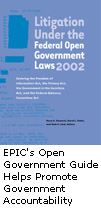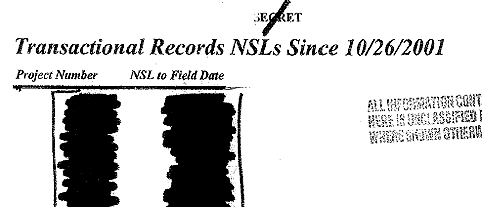| Introduction
 The
Freedom of Information Act establishes a legal right for
individuals to obtain records in the possession of government
agencies. The FOIA is critical for the functioning of
democratic government because it helps ensure that the
public is fully informed about matters of public concern.
The FOIA has helped uncover fraud, waste, and abuse in
the federal government. It has become particularly important
in the last few years as the government has tried to keep
more of its activities secret. The
Freedom of Information Act establishes a legal right for
individuals to obtain records in the possession of government
agencies. The FOIA is critical for the functioning of
democratic government because it helps ensure that the
public is fully informed about matters of public concern.
The FOIA has helped uncover fraud, waste, and abuse in
the federal government. It has become particularly important
in the last few years as the government has tried to keep
more of its activities secret.
A hallmark of the new surveillance measures proposed
by various government agencies is their disregard for
public accountability. As the government seeks to expand
its power to collect information about individuals, it
increasingly hides that surveillance power behind a wall
of secrecy. Congress has long recognized this tendency
in the Executive Branch, and sought to limit government
secrecy by creating legal obligations of openness under
the FOIA and the Privacy Act of 1974. EPIC has used these
open government laws aggressively to enable public oversight
of potentially invasive surveillance initiatives.
Public access through the FOIA not only allows for a
more informed public debate over new surveillance proposals,
but also ensures accountability for government officials.
Public debate fosters the development of more robust security
systems and leads to solutions that better respect the
nation's democratic values. EPIC's FOIA litigation activity
over the past year has resulted in disclosure of information
about several government surveillance programs. The EPIC
FOIA Gallery highlights some of the most significant documents
we obtained this year. |
| |
|
| Northwest
Airlines Provides Millions of Records to NASA

Documents obtained by EPIC under the
FOIA revealed that Northwest Airlines, in violation
of its stated privacy policy, released records concerning
millions of airline passengers to the National Aeronautics
and Space Administration. The information was used
in support of research into government data mining
and screening systems. NASA retained the data for
almost two years, and returned it to the airline
only after the public outcry over a similar improper
disclosure by JetBlue. The Northwest incident comes
in the midst of an ongoing controversy surrounding
the Computer Assisted Passenger Prescreening System
(CAPPS II). |
|
|
| Majority
Leader Uses FAA to Track Texas State Legislators

EPIC obtained Federal Aviation Administration
transcripts and audio recordings concerning a request
by the office of U.S. House of Representatives Majority
Leader Tom DeLay (R-TX) to track Democratic Texas
legislators leaving the state by air. The state
lawmakers were seeking to prevent a vote on a controversial
re-districting plan supported by Republicans. The
audio recordings of telephone conversations between
the FAA's Washington Operations Center and various
field employees indicate that FAA employees were
misled into believing that the request to track
the legislators was part of an official Congressional
investigation. |
|
|
| Passengers
Wrongly Flagged by TSA's No Fly List

Documents released as a result of an FOIA lawsuit
litigated by EPIC raise important questions about
how the Transportation Security Administration has
operated its "selectee" and "No-Fly"
watchlists. The released material details scores
of complaints filed with TSA by air passengers wrongly
flagged by the watchlist system and documents the
inability of the agency to remedy persistent problems
created by the screening system. These complaints
likely preview the kinds of difficulties that thousands
of passengers will experience if CAPPS II is deployed. |
|
| National
Security Letters Used With No Transparency

Heavily censored documents highlight
the Justice Department's refusal to disclose basic,
statistical information concerning implementation
of the controversial USA PATRIOT Act. DOJ released
only a blacked-out, six-page document listing National
Security Letters (NSLs) issued during the first
year after the Act went into effect. NSLs are issued
by the FBI, without judicial involvement, to compel
the disclosure of broad categories of personal information.
The secrecy surrounding the government's use of
PATRIOT Act powers has hampered public debate on
the controversial law. |
|
| Complaints
Show Need for Telemarketing Do-Not-Call List

In November 2003, the Tenth Circuit
Court of Appeals held a hearing in a challenge to
the Federal Trade and Federal Communication Commissions'
Do-Not-Call Registry rules. In anticipation of this
hearing, EPIC employed the Freedom of Information
Act to obtain complaints made by individuals to
the Federal Communications Commission about telemarketing
to demonstrate the need for a national Do-Not-Call
Registry. The Federal Communications Commission
relied upon 11,000 consumer complaints in its decision
to support the creation of a Do-Not-Call Registry.
EPIC scanned in 100 of those complaints and grouped
them roughly into three categories: telemarketers
who ignore or frustrate individuals' requests to
stop calling, telemarketers who become abusive or
harass individuals, and the frustration that individuals
experience as a result of autodialer and prerecorded
voice calls. These complaints demonstrate that the
new telemarketing regulations are a rational response
to serious abuses in the telemarketing industry. |
|
| Complaints
About Credit Reporting Agencies Increase

EPIC testified before Congress twice
in 2003 regarding amendments to the Fair Credit
Reporting Act. As part of the research for testimony,
EPIC obtained documents from the Federal Trade Commission
regarding consumer complaints on the big three credit
reporting agencies, Experian, Equifax, and Trans
Union. Complaints against the big three have risen
dramatically in recent years. |
|
|